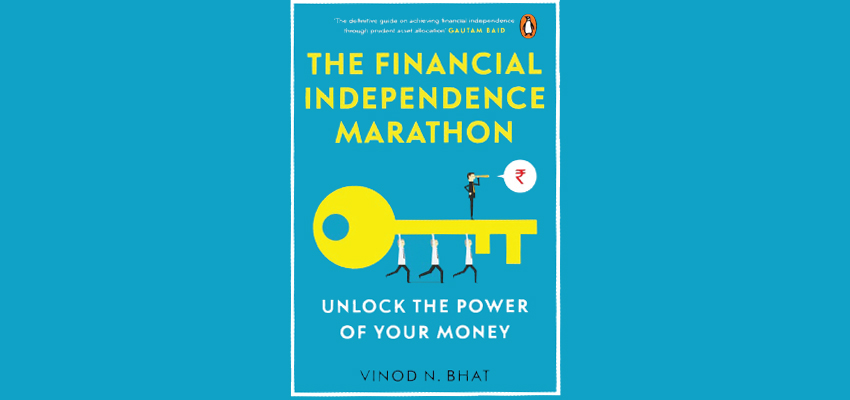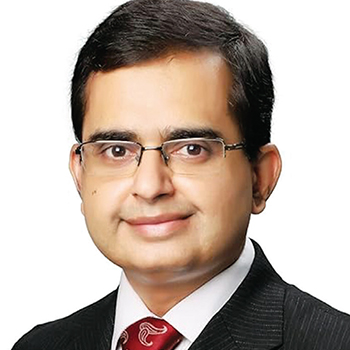Finance, like, success is not a sprintis not a sprint

The Financial Independence Marathon: Unlock the Power of Your Money by financial analyst Vinod N. Bhat is a must-read for any investor stuck in the familiar but largely restrictive and in some ways outdated world of property, gold, and Fixed Deposits. The gains in venturing out, enumerated, in simple and lucid language, are concrete.
You will learn a new framework that covers asset allocation and the five basic principles of financial planning as well as the basics of various asset classes and investment solutions. This should help you make better investment decisions and complete your journey to financial independence successfully
Time is money,” goes the adage. But the opposite is also true—meaning ‘money is time.’ Money, if used wisely, makes us free and gives us time to do what makes us happy. It is crucial to understand the concept that money creates time because time is a non-renewable resource. And, becoming financially independent is like finding a hidden treasure of time—a veritable god mine because it gives us the ability to live life on our terms. As Robert Kiyosaki, the acclaimed author, points out: Financial independence is about having more choices. It gives you the opportunity to consider your choices and select only those that give you happiness.”
This, in a nutshell, is the key reason to read Vinod Bhat’s work: The Financial Independence Marathon: Unlock the Power of Your Money. An easy, entertaining, and actionable guide to becoming financially independent and avoiding the common pitfalls on the journey, this work is certain to change the way you approach your money, whether you are in your twenties, thirties or forties.
Entertaining and informative
What this book certainly isn’t is yet another text-book on economics. It is instead a very engaging, humorously written, and comprehensive guide that draws from real life episodes that us non-finance folks can relate to. Usefully so, it covers a wide range of financial instruments from traditional investments like FDs, stocks, mutual funds, and real estate to modern day entrants from NFTs to start-ups and crypto currency. The financial advice becomes even more resonant given that complex topics have been broken into digestible bits, rendering the subject easy and for every reader whether they are beginners, advanced investors or working professionals in the finance industry.
Top tips and key takeaways
- Financial independence goes beyond delayed gratification and saving money. That’s just the first step. The real flex is to invest our savings such that they generate passive streams of income and grow our wealth.
- We should expect and accept challenges as part of the marathon and be flexible and adaptable to circumstances.
- Stop competing with others and instead focus on your own journey.
- Preparation is the key differentiator between success and failure. It would be helpful to seek the services of an expert in the form of a financial advisor, so that we avoid key mistakes. Done right and with some discipline, the journey is easier than you think
- The reason most people are not able to successfully complete the journey to financial independence is not just the lack of financial knowledge or overconfidence in their own ability to manage money. The core issue is lack of trust.
- We need to understand the source of financial misery and how we can avoid some of it.
- Think of the risks involved in any investment first before getting excited about the reason. To that end, a balanced asset allocation is crucial. 80 to 90 per cent of the performance variability between an investor’s portfolio and the market is due to asset allocation and less than 10 to 20 per cent is due to individual product selection or market timing.
- Asset allocation works because of the negative correlation between asset classes. In other words, if one asset class, such as stocks, underperforms at some point in time, other assets like gold or bonds are likely to outperform it and balance things out. That’s how a portfolio remains healthy over the long term.
- Keep insurance and investments separate. For life insurance, the best option is to go with a term plan. What’s more, augment the health insurance cover you get with your employer with an additional separate insurance cover of your own.
- Investment-Savings=Expenses. When we receive our salary, we should first set aside at least 10 to 20 per cent as our savings and spend only the remaining amount.
- Beware of the little expenses. All your small impulse spends such as coffee on the go and online shopping add up.
- Compound interest is the most powerful force in the world. One who understands compound interest, receives it. And one who doesn’t, pays it. Always remember, time is on your side in the compound interest formula.
- Always have an emergency fund that will cover 6 to 12 months of expenses. Fixed deposits are a fine way of doing this.
- Think of investing in any risky asset only after you have this basic emergency fund in place.
- Some investment products can give negative returns at times, and it is possible to end up with an amount less than the target amount. This is called market risk. Avoid investment products subject to market risk if you have a fixed goal with a short- term horizon. Capital preservation is critical.
- Inflation is the constant increase in prices that brings down the value of money. Thus, aim to invest in products where the expected after tax return will be higher than inflation.
- For the majority of the population, mutual funds would be the ideal investment products to achieve a balanced allocation with the least hassle. They can provide diversification even if investors have a limited sum like say a few hundred rupees each month.
- For most investors, getting a return that is 2 to 3 per cent per annum higher than the interest rate on FD is a realistic target
The above are just some of the concepts broken down for the average reader and are easy to keep in mind. The language is simple but elegant, and it is an easy breezy read, unhampered by the weight of Bhat’s evident expertise and scholarship
ABOUT THE AUTHOR
 Vinod N. Bhat
Vinod N. Bhat
Vinod N. Bhat has more than fifteen years of experience in the financial services industry and is currently working as a senior vice president and portfolio manager at Aditya Birla Sun Life AMC Ltd in Mumbai. He has an MBA in finance from the Wharton School, USA, an MS in industrial engineering from Pennsylvania State University, USA, and a BTech in mechanical engineering from IIT Bombay. Vinod is also a chartered financial analyst (CFA) charterholder. As part of his work, he has been writing, speaking and creating videos on various topics, including investments, the current state of markets and future outlook, and mutual funds, for the past four years. His audience has been retail investors, high-net-worth individuals, independent financial advisers and mutual fund distributors, among others. He has conducted more than 400 sessions with them so far. This has given him a good understanding of their knowledge of the subject (or lack thereof) and the best way to communicate with them. He lives with his mother, wife and daughter in Mumbai/Pune.